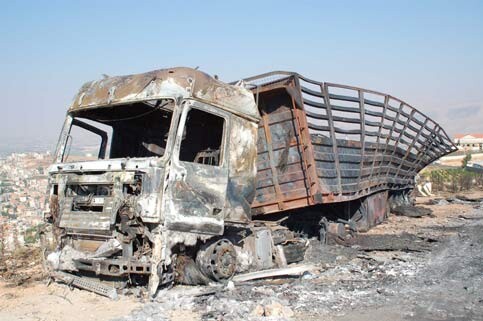IRIN 6 August 2006

A bombed out truck on the road between the Beqaa Valley and Beirut, 4 August 2006. (Christian Henderson/IRIN)
BEIRUT - Lebanese agricultural production, badly affected by the hostilities between Israel and Hezbollah, faces a crisis if the conflict does not end soon, according to government officials.
“The sector has been hit very badly because all the roads have been hit, there is no possibility to go from one village to another or from the field to the market, and you can’t reach the fields to harvest because there is always bombing and shelling,” said Talal Al-Sahili, the Agriculture Minister.
The death of 33 farm workers in the northern Beqaa valley on Friday highlighted the kinds of risks many in the industry face. The workers, mostly Syrians, were killed in an Israeli air strike as they were loading a truck with fruit in fields near the Lebanese town of Qaa.
The conflict began on 12 July after Hezbollah captured two Israeli soldiers on the border between Lebanon and Israel. According to the latest official figures from the Lebanese and Israeli governments, 907 Lebanese and 75 Israelis have been killed in the conflict.
In addition to human life the financial cost to agriculture is estimated to be huge. “Tens of millions of dollars is only a first estimate,” said Sahili.
Sahili said the sub-sectors that had been hit the hardest were poultry and citrus farming. Poultry farms have been unable to obtain chicken feed due to the blockade and as many as 80 percent of stock in some farms have died.
Citrus crops on the coastal plains of southern Lebanon have been left to rot during harvest-time as farmers cannot get to their fields because of air raids.
But all aspects of the agricultural sector have been affected by the conflict, Sahili said. Israel’s targeting of trucks has meant farmers have been unable to transport their crops, including lemons, oranges, sugar beet and tobacco, to the market, even when they are able to harvest them. In the Beqaa valley, the US $40 million Liban Lait milk factory was devastated in an Israeli air strike more than two weeks ago, stripping milk farmers of a market.
“This milk factory was one of the best in the Middle East,” said Sahili. The loss of revenue will leave many farmers in debt.
There is only one harvest a year, which is used to repay the money borrowed to fund production. “But now farmers will not only suffer a loss of revenue but they will also have debt,” said Kanj Hamade, an agriculture student from the town of Hermel, in the northern Beqaa.
“The other problem is that there is no power so they will not be able to store their produce,” Hamade said.
The conflict is now entering its fourth week and the number of farmers affected is growing.
Lebanon’s wine industry, worth US $25 million and expanding rapidly, is also suffering. “The harvest normally starts in early September. If this does not stop by the time the harvest starts then there will be a catastrophe,” said Charles Ghostine, the managing director of Ksara vineyard in the Beqaa valley.
“What happened when these farm workers were [killed on Friday] makes it clear that if there is no ceasefire then it will be almost impossible to harvest,” he added.
Ghostine said the intense air raids and blockade in the current conflict were the worst the sector had ever faced. “We could harvest all the years through the civil war [1975-90]; we never skipped one year,” he said.
The government estimates the total cost of the damage inflicted on Lebanon to be more than US $2 billion and the country will require at least four years to recover economically.
Related Links
This item comes to you via IRIN, a UN humanitarian news and information service, but may not necessarily reflect the views of the United Nations or its agencies. All IRIN material may be reposted or reprinted free-of-charge; refer to the copyright page for conditions of use. IRIN is a project of the UN Office for the Coordination of Humanitarian Affairs.